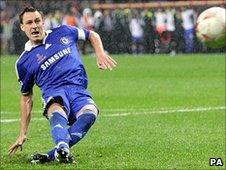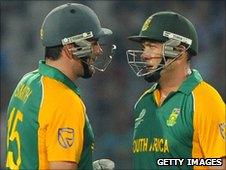The psychology of choking
- Published
Rory McIlroy's Masters nightmare
The Champions League semi-finals are still a few days away, but the prospect of the dreaded penalty shoot-out is already looming.
Chelsea captain John Terry has admitted that it took months to come to terms with the spot-kick he missed in the Champions League final in 2008,, external when he slipped before making contact with the ball.
Former England defender Gareth Southgate will probably always be associated with his miss at the European Championship semi-final in 1996, when he shot with a woeful lack of conviction.
Both men have testified how treacherously difficult it is to score from 12 yards when you are shouldering the hopes of millions.
It is not the difficulty of the task - most top players invariably score during practice sessions - but the enormity of the moment. The problem is not ability but nerve. This, of course, is the essence of performance psychology.

Chelsea captain Terry slipped as he missed his penalty in 2008
The tendency to lose one's nerve - or "choke" - was seen in graphic fashion in the Masters at Augusta earlier this month. Rory McIlroy was within touching distance of the Green Jacket when he underwent a devastating implosion., external
It was not just his woods and irons that deserted him, but his putting and chipping, too. For a while it was as if he had become a novice again.
Few of us have played international sport, but in a curious way we can all relate to the curse of choking. When we are interviewed for a job we don't care about, we are relaxed, confident and the answers flow.
But when we are interviewed for a job that means everything, that is when our mouth dries and our brain, all too often, stalls. We fluff our lines in precisely the same way McIlroy fluffed his drive on the 10th tee.
But why? Why are so many of us inclined to mess up at precisely the moment when messing up is most calamitous? Why are we so prone to fail when we most want to succeed?
For years the paradox of choking seemed incomprehensible to psychologists and sportsmen alike. It is only in recent years that neuroscientists have glimpsed the answers, and they are both intriguing and revelatory.
Consider what happens when you are learning a task, say driving a car. When you start out, you have to focus intently to move the gearstick while shifting the steering wheel and pushing the clutch. Indeed, at the beginning these tasks are so difficult to execute that the instructor starts you off in a car park.

South Africa's cricketers have been frequently labelled 'chokers' after collapsing in World Cups
But now consider what happens after hundreds of hours of practice. Now, you can perform these skills effortlessly, without any conscious control, so that you are able to arrive at your destination without even being aware of how you got there.
In effect, experts and novices use two completely different brain systems. Long practice enables experienced performers to encode a skill in implicit memory, and they perform almost without thinking about it.
This is called expert-induced amnesia. Novices, on the other hand, wield the explicit system, consciously monitoring what they are doing as they build the neural framework supporting the task.
But now suppose an expert were to suddenly find himself using the "wrong" system. It wouldn't matter how good he was because he would now be at the mercy of the explicit system.
The highly sophisticated skills encoded in the subconscious part of his brain would count for nothing. He would find himself striving for victory using neural pathways he last used as a novice.
This is the neurophysiology of choking. It is triggered when we get so anxious that we seize conscious control over a task that should be executed automatically.
That is why McIlroy's technique was so stilted - explicit monitoring was vying with implicit execution. The problem was not insufficient focus, but too much focus. Conscious monitoring had disrupted the smooth workings of the subconscious. He was, in a literal sense, a novice again.
This is why choking is so dramatic: it triggers a psychological metamorphosis. And this is why those slated to taken penalties in the semi-finals will be working as hard on their mental as their physical games.
There are many methods that can avert choking, but the ultimate objective can be summed up in one sentence. As the Nike ad puts it: "Just do it".
Matthew Syed is the author of Bounce: The Myth of Talent and the Power of Practice